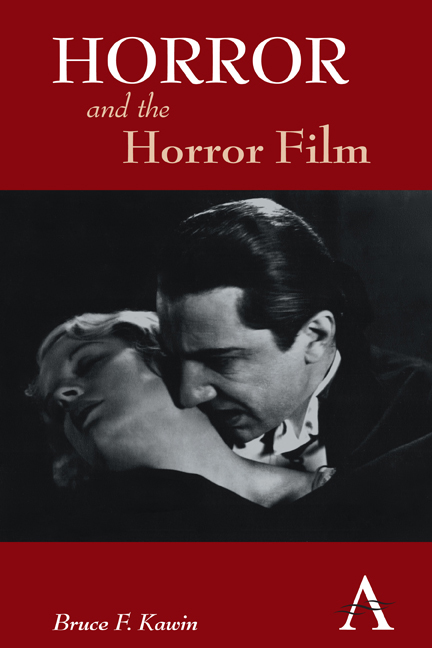Book contents
- Frontmatter
- Dedication
- Contents
- Preface
- List of Figures
- Part I Approaching the Genre
- 1 Horror
- 2 The Monster at the Bedroom Window
- 3 Fear in a Frame
- Part II Subgenres: The Book of Monsters
- 4 Monsters
- 5 Supernatural Monsters
- 6 Humans
- Part III Related Genres
- 7 Horror Comedy
- 8 Horror Documentary
- Notes
- Films Cited
- Selected Bibliography
- Index
- Frontmatter
- Dedication
- Contents
- Preface
- List of Figures
- Part I Approaching the Genre
- 1 Horror
- 2 The Monster at the Bedroom Window
- 3 Fear in a Frame
- Part II Subgenres: The Book of Monsters
- 4 Monsters
- 5 Supernatural Monsters
- 6 Humans
- Part III Related Genres
- 7 Horror Comedy
- 8 Horror Documentary
- Notes
- Films Cited
- Selected Bibliography
- Index
Summary
The monster is the key to the basic horror structure, but sometimes the horror figure will emerge as the film itself, as in Dead of Night, or the best analogy for the horrific situations and events in a movie will turn out to be a movie, as in Peeping Tom and the Scream series. Horror films, and not only the reflexive ones, set traps for their audiences and their characters, frightening and appalling them while presenting horror as the inescapable journey. They also offer avenues of release and safety, which may be a matter of undergoing a period as a monster or merging one's characteristics with those of a monster. One learns from horror and grows from confronting it, as the lawman with the fear of water does in Jaws. Monsters can be killed, and their dying or their corpses are often the last or next-to-last thing shown in a monster movie, to declare that the monster is dead and to focus sympathy if it is appropriate. Supernatural powers can be opposed by other forces, from religion to love, and supernaturally animated beings can be destroyed through ritual and courage. Human monsters can be killed by other humans. But not all horror movies are movies about killing monsters and vanquishing threats. In many the monsters survive, and in some cases the normal world and the world of horror are integrated. This happens in horror comedies as well as in horror documentaries. When horror is crossed with other genres, such as science fiction, a new subgenre that is set between them is formed: in this case science fiction horror. The assumptions of those subgenres reveal much about the assumptions of the master genres they integrate.
Monster Comedies: Young Frankenstein
The most uncompromising horror comedy may be Bambi Meets Godzilla (Marv Newland, 1969, Canada), an animated film that is two minutes long. Bambi munches grass, then gets stomped flat. It is funny in an awful way.
Comedies often confront chaos or some other radical upset, and sometimes absorb it into their worlds by the conclusion. In the same way, they can integrate the monsters and disturbances of horror into a world that is and remains fundamentally comic.
The chief job of the horror comedy is to make us laugh at material that is frightening and repulsive, like the crushing of Bambi.
- Type
- Chapter
- Information
- Horror and the Horror Film , pp. 198 - 203Publisher: Anthem PressPrint publication year: 2012



